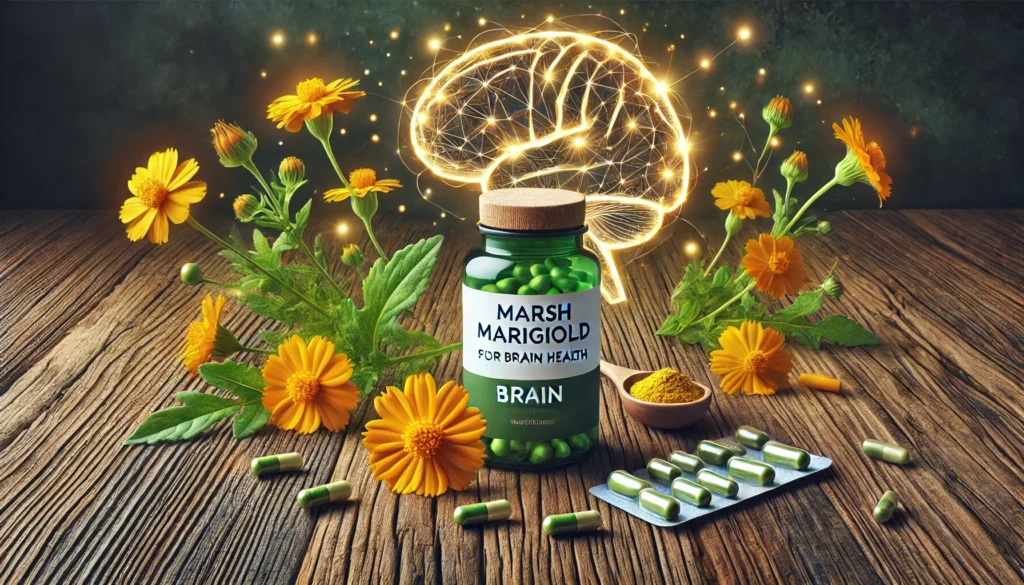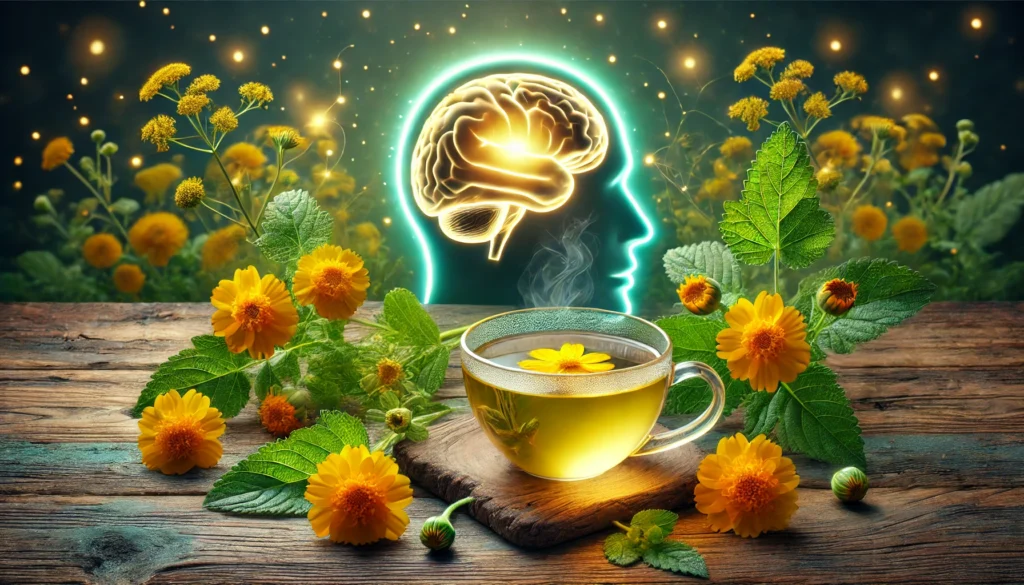Marsh Marigold (Caltha palustris) is a perennial plant native to Europe, North America, and parts of Asia. Known for its vibrant yellow flowers and preference for wetland environments, this plant has long been utilized in traditional medicine for a range of ailments. However, recent scientific interest has shifted towards exploring Marsh Marigold’s potential as a nootropic supplement. Nootropics, often referred to as “smart drugs,” are substances that aim to improve cognitive functions such as memory, learning, focus, and overall brain health. This article delves into the pharmacological properties of Marsh Marigold, its nootropic benefits, dosage recommendations, side effects, drug interactions, and potential risks associated with its supplementation.
You May Also Like:
Sources of Marsh Marigold
Marsh Marigold can be found in wetland areas across temperate regions, thriving in moist soil conditions such as bogs, marshes, and alongside riverbanks. The plant is easily recognized by its bright yellow flowers and heart-shaped leaves. Traditionally, different parts of the plant, including the leaves, roots, and flowers, have been used in folk medicine to treat ailments such as skin irritations, sore throats, and rheumatism. In modern herbalism, Marsh Marigold has gained attention for its bioactive compounds that are thought to provide cognitive benefits, especially in the context of nootropic supplementation.

Chemistry of Marsh Marigold
The active compounds in Marsh Marigold are primarily found in its roots, stems, and flowers. The plant contains a variety of bioactive molecules, including alkaloids, flavonoids, saponins, and tannins. These compounds are believed to play a role in Marsh Marigold’s potential therapeutic effects.
- Alkaloids: Marsh Marigold contains alkaloids, such as protoanemonin, which are known for their potential anti-inflammatory, analgesic, and sedative properties. These alkaloids may influence neural pathways, promoting relaxation and potentially providing neuroprotective benefits.
- Flavonoids: Flavonoids, such as quercetin and kaempferol, are powerful antioxidants found in Marsh Marigold. These compounds have been shown to reduce oxidative stress in the brain, which is crucial in preventing neurodegenerative diseases such as Alzheimer’s and Parkinson’s.
- Saponins: Saponins have been noted for their ability to support immune health, and they also have mild neuroprotective properties that could contribute to Marsh Marigold’s nootropic potential.
- Tannins: Tannins possess anti-inflammatory properties and can help reduce oxidative stress, further contributing to Marsh Marigold’s neuroprotective effects.
These compounds work synergistically to support brain health, reduce inflammation, and improve cognitive function, making Marsh Marigold an intriguing candidate for nootropic supplementation.
Physiological Mechanisms of Marsh Marigold in the Body and Brain
The active constituents of Marsh Marigold impact the body and brain through several mechanisms. While the plant has traditionally been used for its anti-inflammatory and sedative effects, recent studies have focused on how its compounds may support brain health and cognitive function.
- Antioxidant and Neuroprotective Effects: Oxidative stress is a leading contributor to cognitive decline and neurodegenerative diseases. The flavonoids found in Marsh Marigold, such as quercetin, are potent antioxidants that neutralize free radicals, reducing the damage they cause to neurons. This antioxidative effect may help prevent the onset of conditions like Alzheimer’s and Parkinson’s disease, which are linked to oxidative damage. Additionally, Marsh Marigold’s tannins contribute to its neuroprotective properties by further reducing inflammation in the brain, thereby supporting healthy brain aging and cognitive function.
- Neurotransmitter Modulation: The alkaloids and flavonoids in Marsh Marigold may also influence neurotransmitter systems, particularly the GABAergic and serotoninergic pathways. By enhancing GABAergic transmission, Marsh Marigold may help regulate anxiety and promote relaxation, which can improve overall cognitive function. Furthermore, serotonin plays a key role in mood regulation, memory, and learning, and its modulation could potentially contribute to cognitive clarity and emotional stability.
- Cognitive Enhancement: Marsh Marigold has demonstrated sedative and calming effects, which can help reduce anxiety and mental fatigue. While its sedative action may initially appear counterintuitive to cognitive enhancement, this effect can actually support brain function by promoting mental clarity and focus. By reducing stress and anxiety, Marsh Marigold may enable individuals to concentrate better and enhance cognitive performance.

Nootropic Benefits of Marsh Marigold
The growing interest in Marsh Marigold as a nootropic supplement is rooted in its ability to improve various aspects of cognitive function. Although research is still limited, there is promising evidence supporting its role in brain health:
- Mood Regulation and Stress Reduction: As a plant with mild sedative properties, Marsh Marigold may be useful for individuals seeking to improve their mood and reduce stress. Studies suggest that its active compounds influence GABA receptors, which help regulate relaxation and calmness in the brain. In this way, Marsh Marigold may be beneficial for reducing symptoms of anxiety and promoting a balanced emotional state, both of which contribute to better cognitive performance.
- Neuroprotection and Age-Related Cognitive Decline: Marsh Marigold’s flavonoid content provides antioxidant protection that helps to mitigate oxidative damage in brain cells. By scavenging free radicals and reducing inflammation, Marsh Marigold may protect against age-related cognitive decline and improve long-term brain health. This neuroprotective effect makes it a promising supplement for individuals concerned with maintaining cognitive function as they age.
- Improved Sleep Quality: Sleep is crucial for cognitive function, and Marsh Marigold’s calming effects could help individuals who struggle with insomnia or disrupted sleep patterns. By reducing anxiety and promoting relaxation, the plant may contribute to deeper, more restorative sleep. Better sleep quality, in turn, supports memory consolidation, learning, and overall cognitive health.

Dosage and Supplementation Guidelines
Currently, there are no established standardized doses for Marsh Marigold as a nootropic supplement. However, traditional herbal medicine uses Marsh Marigold in various forms, including teas, tinctures, and extracts. For those considering Marsh Marigold supplementation, it is important to adhere to general guidelines and consult with a healthcare provider for personalized dosing recommendations.
- Standard Dosage: For general cognitive enhancement, a typical dosage range for Marsh Marigold extract could be 200–400 mg per day. These doses may help individuals experience its sedative effects without excessive sedation. However, individuals with specific cognitive concerns or those seeking neuroprotective benefits may require higher doses under professional supervision.
- Forms of Supplementation: Marsh Marigold is available in various supplement forms, including capsules, tinctures, and dried flowers for teas. Each form will have a different concentration of active ingredients, so it is important to follow product-specific dosing guidelines.
Side Effects and Safety
While Marsh Marigold is generally considered safe when used as directed, there are some potential side effects and risks associated with its use. As with any supplement, individuals should use caution, especially when introducing a new herbal remedy into their regimen.
- Possible Side Effects: Marsh Marigold is known to have mild sedative effects, which may cause drowsiness or a feeling of calm. While this is generally considered beneficial, excessive sedation may lead to fatigue or difficulty concentrating. Additionally, some individuals may experience digestive discomfort, such as nausea or upset stomach, particularly when using high doses.
- Toxicity and Overdose: Marsh Marigold is considered safe when consumed in moderation, but its alkaloid content (notably protoanemonin) may pose a risk if consumed in large quantities. Protoanemonin is toxic in high doses and can lead to symptoms such as nausea, vomiting, and gastrointestinal distress. Therefore, it is important to follow recommended dosages and avoid using high doses without professional guidance.
- Allergic Reactions: As with many plants, individuals may be allergic to Marsh Marigold. Symptoms of an allergic reaction can include skin rashes, itching, or swelling. If any allergic reactions occur, discontinuing use and seeking medical advice is recommended.

Interactions with Other Supplements and Medications
Marsh Marigold may interact with other substances, especially those that affect the central nervous system. It is important to consider the following potential interactions:
- Sedatives and Anti-Anxiety Medications: Since Marsh Marigold has sedative properties, it may amplify the effects of other sedative drugs or supplements, such as benzodiazepines, antidepressants, or herbal sedatives like valerian root. Combining Marsh Marigold with such substances may lead to excessive drowsiness or sedation.
- Blood Pressure Medications: Some herbal supplements, including Marsh Marigold, may have a mild hypotensive effect, lowering blood pressure. When combined with blood pressure medications, this effect may be enhanced, potentially leading to hypotension.
- Other Nootropics: Although Marsh Marigold has potential nootropic benefits, it may interact with other cognitive-enhancing supplements, such as stimulants or racetams. Careful attention should be paid to ensure that there are no adverse interactions or overstimulation.
Risks for Individuals with Certain Health Conditions
- Pregnancy and Breastfeeding: The safety of Marsh Marigold during pregnancy and breastfeeding is not well-documented. Pregnant or breastfeeding women should consult a healthcare provider before using this supplement.
- Liver or Kidney Disease: Individuals with liver or kidney disease should use Marsh Marigold with caution, as the plant’s compounds may place additional stress on these organs, especially in high doses.
Conclusion
Marsh Marigold (Caltha palustris) holds promise as a nootropic supplement due to its bioactive compounds, which offer potential cognitive, neuroprotective, and mood-regulating benefits. Its antioxidant properties, sedative effects, and ability to promote relaxation and focus make it a valuable addition to the growing field of herbal nootropics. However, more research is needed to fully understand its mechanisms and optimal dosages.
For those considering Marsh Marigold supplementation, it is essential to follow recommended dosage guidelines and consult a healthcare provider to ensure safety, particularly in individuals with existing health conditions or those taking other medications. Despite its potential, Marsh Marigold should be used with caution, particularly due to its mild toxicity and possible interactions with other drugs. When used responsibly, it may offer a natural and effective way to support cognitive function and overall brain health.

References:
- Marsh Marigold – Uses, Side Effects, and More. Retrieved from: https://www.webmd.com/vitamins/ai/ingredientmono-655/marsh-marigold
- Oxidative Stress in Alzheimer’s and Parkinson’s Diseases: Insights from the Yeast Saccharomyces cerevisiae. Retrieved from: https://pmc.ncbi.nlm.nih.gov/articles/PMC3371773/
- Unique and interactive effect of anxiety and depressive symptoms on cognitive and brain function in young and older adults. Retrieved from: https://pmc.ncbi.nlm.nih.gov/articles/PMC4222514/
- Oxidative Damage and Cognitive Dysfunction: Antioxidant Treatments to Promote Healthy Brain Aging. Retrieved from: https://pmc.ncbi.nlm.nih.gov/articles/PMC4392815/
- Cognitive Health and Older Adults. Retrieved from: https://www.nia.nih.gov/health/brain-health/cognitive-health-and-older-adults
Important Note: The information contained in this article is for general informational purposes only, and should not be construed as health or medical advice, nor is it intended to diagnose, prevent, treat, or cure any disease or health condition. Before embarking on any diet, fitness regimen, or program of nutritional supplementation, it is advisable to consult your healthcare professional in order to determine its safety and probable efficacy in terms of your individual state of health.
Regarding Nutritional Supplements Or Other Non-Prescription Health Products: If any nutritional supplements or other non-prescription health products are mentioned in the foregoing article, any claims or statements made about them have not been evaluated by the U.S. Food and Drug Administration, and such nutritional supplements or other health products are not intended to diagnose, treat, cure, or prevent any disease.


